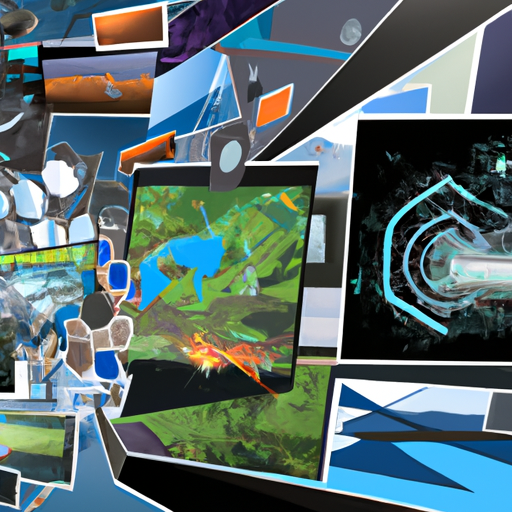
The Role of Collaborative Expertise in Maximizing AI’s Potential
Artificial Intelligence (AI) has become an integral part of our lives, revolutionizing various industries and transforming the way we work. From healthcare to finance, AI has proven to be a game-changer, enabling businesses to streamline processes, make data-driven decisions, and enhance customer experiences. However, to truly harness the power of AI, collaborative expertise plays a crucial role.
Collaborative expertise refers to the collective knowledge and skills of individuals working together towards a common goal. In the context of AI, it involves bringing together experts from different domains, such as data scientists, engineers, and domain specialists, to collaborate and maximize the potential of AI technologies.
One of the key benefits of collaborative expertise in AI is the ability to address complex problems that require a multidisciplinary approach. AI systems are only as good as the data they are trained on, and domain experts play a vital role in ensuring that the data used is relevant and accurate. By collaborating with domain specialists, AI developers can gain valuable insights into the specific challenges and nuances of a particular industry, leading to more effective AI solutions.
Moreover, collaborative expertise helps in overcoming the limitations of AI algorithms. While AI algorithms are incredibly powerful, they are not infallible. They can be biased, make incorrect predictions, or fail to generalize to new situations. By involving experts from different fields, these limitations can be identified and addressed. For example, a data scientist working on an AI system for diagnosing diseases can collaborate with medical professionals to ensure that the system takes into account the latest medical research and guidelines.
Collaborative expertise also plays a crucial role in ensuring the ethical use of AI. AI technologies raise important ethical considerations, such as privacy, fairness, and accountability. By involving experts in ethics and law, organizations can navigate these complex issues and develop AI systems that are not only effective but also responsible. This collaborative approach helps in building trust among users and stakeholders, which is essential for the widespread adoption of AI technologies.
Furthermore, collaborative expertise fosters innovation and creativity in AI development. When experts from different backgrounds come together, they bring unique perspectives and ideas to the table. This diversity of thought can lead to breakthrough innovations and novel approaches to problem-solving. By encouraging collaboration and knowledge sharing, organizations can create an environment that nurtures creativity and pushes the boundaries of what AI can achieve.
In conclusion, collaborative expertise is essential in maximizing the potential of AI. By bringing together experts from different domains, organizations can address complex problems, overcome the limitations of AI algorithms, ensure ethical use, and foster innovation. The power of AI lies not only in the algorithms and technologies but also in the collective knowledge and skills of the people working with them. As AI continues to evolve and shape our world, harnessing its power with collaborative expertise will be key to unlocking its full potential.
Leveraging AI and Collaborative Expertise for Enhanced Decision-Making

Artificial Intelligence (AI) has become an integral part of our lives, revolutionizing various industries and transforming the way we make decisions. By harnessing the power of AI and combining it with collaborative expertise, organizations can achieve enhanced decision-making capabilities that can drive success and innovation.
AI, with its ability to analyze vast amounts of data and identify patterns, has the potential to provide valuable insights that can inform decision-making processes. However, to truly leverage the power of AI, it is crucial to combine it with the expertise and knowledge of human collaborators. This collaboration between AI and human experts can lead to more accurate and informed decisions.
One of the key benefits of combining AI with collaborative expertise is the ability to process and analyze large volumes of data quickly and efficiently. AI algorithms can sift through massive datasets, identifying trends and patterns that may not be immediately apparent to human experts. By leveraging AI’s computational power, organizations can gain a deeper understanding of complex problems and make data-driven decisions.
However, AI alone cannot fully comprehend the nuances and context of a situation. This is where human expertise comes into play. Human collaborators can provide the necessary context, interpret the results generated by AI, and make informed decisions based on their experience and knowledge. By working together, AI and human experts can complement each other’s strengths and compensate for their respective limitations.
Collaborative expertise also enables organizations to tackle complex problems that require a multidisciplinary approach. AI algorithms can be trained on data from various domains, allowing them to provide insights from different perspectives. By involving experts from different fields, organizations can gain a holistic understanding of a problem and develop innovative solutions that may not have been possible otherwise.
Furthermore, the collaboration between AI and human experts fosters a culture of continuous learning and improvement. As AI algorithms process more data and learn from human feedback, they become more accurate and reliable over time. Human experts, on the other hand, can learn from the insights generated by AI and refine their decision-making processes. This iterative process of learning and improvement can lead to better outcomes and increased efficiency.
To effectively harness the power of AI with collaborative expertise, organizations need to create an environment that encourages collaboration and knowledge sharing. This can be achieved through the use of collaborative platforms and tools that facilitate communication and collaboration between AI systems and human experts. By providing a platform for collaboration, organizations can ensure that the expertise of human collaborators is effectively integrated with AI capabilities.
In conclusion, leveraging AI and collaborative expertise can significantly enhance decision-making capabilities. By combining the computational power of AI with the context and experience of human experts, organizations can gain valuable insights, tackle complex problems, and drive innovation. The collaboration between AI and human experts fosters a culture of continuous learning and improvement, leading to better outcomes and increased efficiency. As AI continues to advance, organizations that embrace collaborative expertise will be well-positioned to thrive in an increasingly data-driven world.
How Collaborative Expertise Drives Innovation in AI Applications
Artificial intelligence (AI) has become an integral part of our lives, revolutionizing various industries and enhancing our daily experiences. From voice assistants like Siri and Alexa to self-driving cars, AI has proven to be a game-changer. However, the true power of AI lies in its ability to collaborate with human expertise, driving innovation and pushing the boundaries of what is possible.
Collaborative expertise is the key to unlocking the full potential of AI applications. By combining the knowledge and skills of human experts with the computational power of AI, we can create solutions that are more accurate, efficient, and impactful. This collaboration allows us to tackle complex problems that would be impossible to solve with either human expertise or AI alone.
One area where collaborative expertise is driving innovation in AI applications is healthcare. Medical professionals have a wealth of knowledge and experience, but they are often overwhelmed by the sheer volume of data they need to analyze. This is where AI comes in. By leveraging machine learning algorithms, AI can process vast amounts of medical data and identify patterns and trends that humans might miss. However, AI is not a substitute for human expertise. Doctors and nurses play a crucial role in interpreting the results and making informed decisions based on their clinical experience. By working together, AI and healthcare professionals can improve diagnosis accuracy, develop personalized treatment plans, and ultimately save lives.
Another field where collaborative expertise is making a significant impact is finance. Financial institutions deal with massive amounts of data, from market trends to customer transactions. AI algorithms can analyze this data in real-time, identify patterns, and make predictions about market movements. However, human expertise is still essential in this domain. Financial experts can provide valuable insights and context that AI algorithms might overlook. By combining the computational power of AI with the analytical skills of financial experts, we can make more informed investment decisions, manage risks more effectively, and optimize portfolio performance.
Collaborative expertise is also driving innovation in the field of education. AI-powered tools can personalize learning experiences, adapt to individual student needs, and provide real-time feedback. However, teachers are still crucial in the learning process. They can provide guidance, support, and motivation that AI cannot replicate. By working together, AI and educators can create a more engaging and effective learning environment, helping students reach their full potential.
In conclusion, collaborative expertise is the driving force behind innovation in AI applications. By combining the computational power of AI with human knowledge and skills, we can create solutions that are more accurate, efficient, and impactful. Whether it’s in healthcare, finance, education, or any other field, the collaboration between AI and human experts is essential for pushing the boundaries of what is possible. Harnessing the power of AI with collaborative expertise has the potential to revolutionize industries, improve outcomes, and enhance our daily lives. So let’s embrace this collaboration and unlock the full potential of AI.


